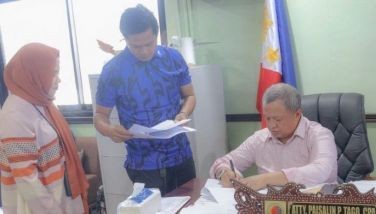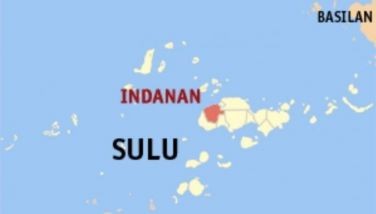Free tuition program in Isabela State U begins this schoolyear
June 8, 2006 | 12:00am
All is set for the implementation of a pilot free tuition program by the Isabela State University (ISU) this schoolyear 2006-2007.
This was announced by ISU, which will offer six major courses without charging tuition. The university charges P100 per unit.
The ISU board of regents, the university’s highest policy-making body, has approved the proposal to pilot the offering of the six courses starting SY 2006-2007.
Classes in the first semester of SY 2006-2007 at ISU open on June 13.
Currently headed by its president, Dr. Romeo Quilang, the ISU is the biggest state university in the Cagayan Valley. It has six campuses: the main campus in Echague town, Roxas, Cabagan, San Mariano, Cauayan, and Jones.
The free tuition courses are Bachelor of Science in Agriculture (BSA), BS in Agricultural Engineering (BSAEng), BS in Agribusiness (BSAB), BS in Animal Husbandry (BSAH), BS in Forestry (BSF), and Diploma in Agricultural Technology leading to Bachelor in Agricultural Technology (DAT-BAT).
Quilang approved the proposal authored by Dr. Robinson Perez, dean of the ISU College of Agriculture (Echague campus).
The program addresses setbacks in agricultural education in Region 3, among them the downtrend in enrollment in agriculture courses, the dwindling number of professionals in agricultural extension service, and untapped agriculture-based enterprises.
"While the program’s general aim is to extend financial assistance and other privileges to those who will enroll in the development courses, it also aims to improve instruction in development courses for quality education," said the ISU, as reported by Monalinda Cadiz, regional applied communication officer of the Cagayan Valley Agriculture and Resources Research and Development (CVARRD) consortium.
The program also offers other privileges, including lodging and housing for juniors and seniors who would set up projects on campus for their theses.
Project financing will also be offered through the Campus Business Affairs Office in each campus.
In launching the free tuition program, the ISU noted that agriculture courses are increasingly being looked down as degrees pursued by students with "minor talents and ambitions."
"Yet in tropical Philippines, agriculture is still the main industry which, sadly, has not reached its full potential from the vast opportunities it has to offer," Cadiz said.
The CVARRD consortium, which groups together the R&D agencies and academic institutions in Region 2, is one of the 14 regional government R&D consortia coordinated by the Los Baños-based Philippine Council for Agriculture, Forestry and Natural Resources Research and Development (PCARRD).
Cadiz said, "Some academic institutions, especially state colleges and universities, are boosting the image of agriculture courses with the hope of encouraging more agriculture degree-takers and eventually helping build a stronger (agricultural) industry."
This was announced by ISU, which will offer six major courses without charging tuition. The university charges P100 per unit.
The ISU board of regents, the university’s highest policy-making body, has approved the proposal to pilot the offering of the six courses starting SY 2006-2007.
Classes in the first semester of SY 2006-2007 at ISU open on June 13.
Currently headed by its president, Dr. Romeo Quilang, the ISU is the biggest state university in the Cagayan Valley. It has six campuses: the main campus in Echague town, Roxas, Cabagan, San Mariano, Cauayan, and Jones.
The free tuition courses are Bachelor of Science in Agriculture (BSA), BS in Agricultural Engineering (BSAEng), BS in Agribusiness (BSAB), BS in Animal Husbandry (BSAH), BS in Forestry (BSF), and Diploma in Agricultural Technology leading to Bachelor in Agricultural Technology (DAT-BAT).
Quilang approved the proposal authored by Dr. Robinson Perez, dean of the ISU College of Agriculture (Echague campus).
The program addresses setbacks in agricultural education in Region 3, among them the downtrend in enrollment in agriculture courses, the dwindling number of professionals in agricultural extension service, and untapped agriculture-based enterprises.
"While the program’s general aim is to extend financial assistance and other privileges to those who will enroll in the development courses, it also aims to improve instruction in development courses for quality education," said the ISU, as reported by Monalinda Cadiz, regional applied communication officer of the Cagayan Valley Agriculture and Resources Research and Development (CVARRD) consortium.
The program also offers other privileges, including lodging and housing for juniors and seniors who would set up projects on campus for their theses.
Project financing will also be offered through the Campus Business Affairs Office in each campus.
In launching the free tuition program, the ISU noted that agriculture courses are increasingly being looked down as degrees pursued by students with "minor talents and ambitions."
"Yet in tropical Philippines, agriculture is still the main industry which, sadly, has not reached its full potential from the vast opportunities it has to offer," Cadiz said.
The CVARRD consortium, which groups together the R&D agencies and academic institutions in Region 2, is one of the 14 regional government R&D consortia coordinated by the Los Baños-based Philippine Council for Agriculture, Forestry and Natural Resources Research and Development (PCARRD).
Cadiz said, "Some academic institutions, especially state colleges and universities, are boosting the image of agriculture courses with the hope of encouraging more agriculture degree-takers and eventually helping build a stronger (agricultural) industry."
BrandSpace Articles
<
>
- Latest
- Trending
Trending
Latest
Trending
Latest
Recommended































